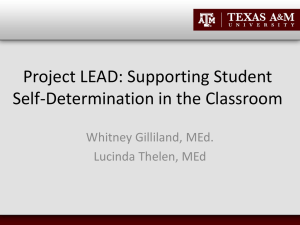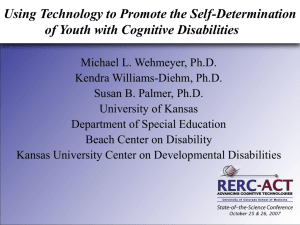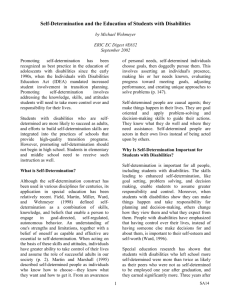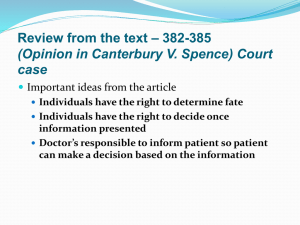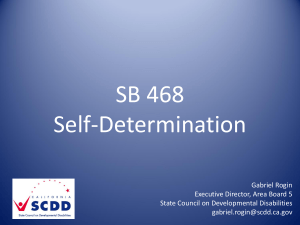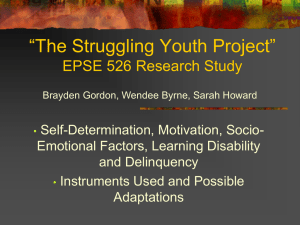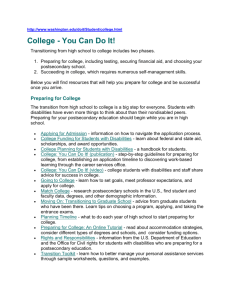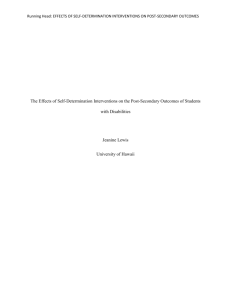Jan 23 2013 self determination references
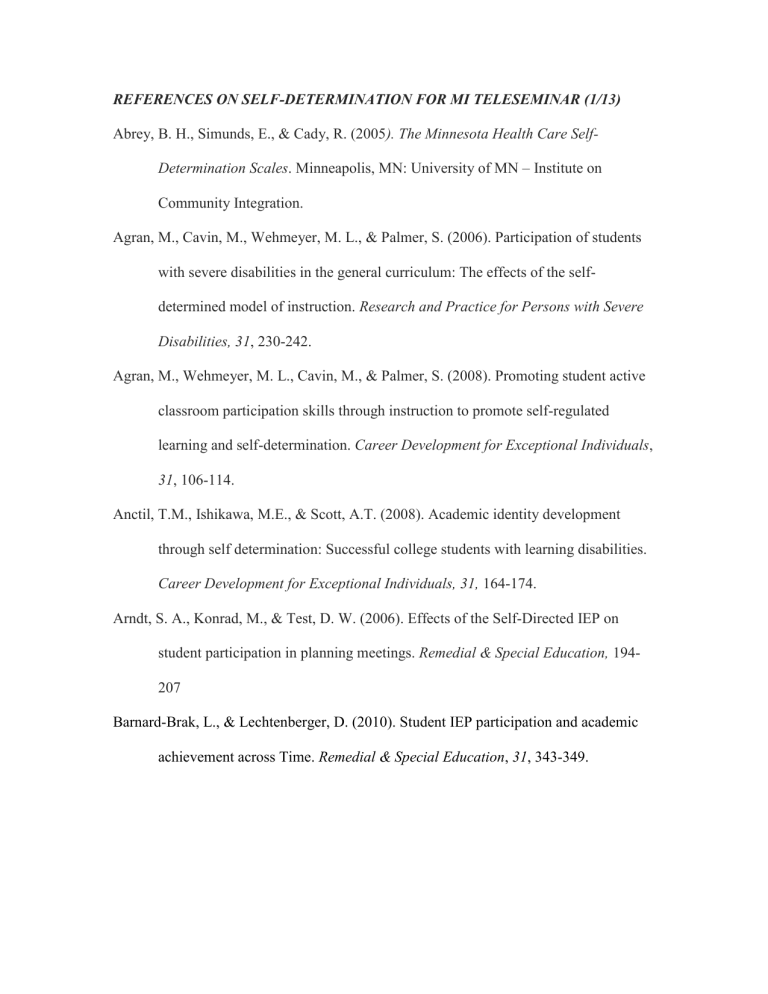
REFERENCES ON SELF-DETERMINATION FOR MI TELESEMINAR (1/13)
Abrey, B. H., Simunds, E., & Cady, R. (2005 ). The Minnesota Health Care Self-
Determination Scales . Minneapolis, MN: University of MN – Institute on
Community Integration.
Agran, M., Cavin, M., Wehmeyer, M. L., & Palmer, S. (2006). Participation of students with severe disabilities in the general curriculum: The effects of the selfdetermined model of instruction. Research and Practice for Persons with Severe
Disabilities, 31 , 230-242.
Agran, M., Wehmeyer, M. L., Cavin, M., & Palmer, S. (2008). Promoting student active classroom participation skills through instruction to promote self-regulated learning and self-determination. Career Development for Exceptional Individuals ,
31 , 106-114.
Anctil, T.M., Ishikawa, M.E., & Scott, A.T. (2008). Academic identity development through self determination: Successful college students with learning disabilities.
Career Development for Exceptional Individuals, 31, 164-174.
Arndt, S. A., Konrad, M., & Test, D. W. (2006). Effects of the Self-Directed IEP on student participation in planning meetings. Remedial & Special Education, 194-
207
Barnard-Brak, L., & Lechtenberger, D. (2010). Student IEP participation and academic achievement across Time. Remedial & Special Education , 31 , 343-349.
Branding, D., Bates, P., & Craig, M. (2008). Perceptions of self-determination by special education and rehabilitation practitioners based on viewing a self-directed IEP versus an external-directed IEP. Research in Developmental Disabilities, 30, 755-
762.
Carter, E.W., Lane, K.L., Crnobori, M., Bruhn, A.L., & Oakes, W. (2011). Selfdetermination interventions for students with and at risk for emotional and behavioral disorders: Mapping the knowledge base. Behavioral Disorders, 36 ,
100-116.
Carter, E.W., Lane, K.L., Pierson, M.R., & Glaeser, B. (2006). Self-determination skills and opportunities for transition-age youth with emotional disturbance and learning disabilities. Exceptional Children, 32 , 108-114.
Carter, E.W., Lane, K.L., Pierson, M.R., & Stang, K.K. (2008). Promoting self- for transition-age youth: Views of general and special educators. Exceptional
Children, 75 , 55-70
Cobb. B., Leman, J., Newman-Gonchar, R., & Alwell, M. (2009). Self-determination for student with disabilities: A narrative metasynthesis. Career Development for
Exceptional Individuals, 32, 108-114.
Denny, S.C. & Daviso, A.W. (2012). Self-determination: A critical component of education. American Secondary Journal, 40, 43-51.
Eisenman, L., Chamberlin, M., & McGahee-Kovac, M. (2005). A teacher inquiry group on student-led IEPs: Starting small to make a difference. Teacher Education and
Special Education, 28, 195-206.
Eisenman, L. T., & Tascione, L. (2002). 'How come nobody told me?' Fostering selfrealization through a high school English curriculum. Learning Disabilities
Research & Practice , 17, 35-46.
Eisenman, L., & Chamberlin, M., (2001). Implementing self-determination activities:
Lessons from the schools. Remedial and Special Education, 22, 138-147.
Field, S. & Hoffman, A. (2002). Preparing youth to exercise self-determination: Quality indicators of school environments that promote the acquisition of knowledge, skills and beliefs related to self-determination. Journal of Disability Policy
Studies, 13 , 113-118.
Field, S. & Hoffman, A. (2007). Self-determination in secondary transition assessment.
Assessment for Effective Intervention, 32 , 181-190.
Getzel, E.E. & Thoma, C. (2008). Experiences of college students with disabilities and the importance of self-determination in higher education settings. Career
Development for Exceptional Individuals, 31, 77-84.
Hammer, M. R. (2004). Using the Self-Advocacy Strategy to increase student participation in IEP conferences. Intervention in School and Clinic, 39, 295-30
Konrad, M., Fowler, C., Walker, A., Test, D., & Wood, W. (2007). Effects of selfdetermination interventions on the academic skills of students with learning disabilities. Learning Disabilities Quarterly, 30 , 89-113.
Lancaster, P. E., Schumaker, J. B., & Deshler, D. D. (2002). The development and validation of an interactive hypermedia program for teaching a self-advocacy strategy to students with disabilities. Learning Disability Quarterly, 25, 277-302.
Longhurst, N. (1994) The self-advocacy movement by people with developmental disabilities: A demographic study and directory of self-advocacy groups in the
United States. Washington, DC: American Association Mental Retardation
Lancaster, P. E., Schumaker, J. B., & Deshler, D. D. (2002). The development and validation of an interactive hypermedia program for teaching a self-advocacy strategy to students with disabilities. Learning Disability Quarterly , 25 , 277-302.
Malian, I. & Nevin, A. (2002). A review of self-determination literature: Implications for practitioners. Remedial and Special Education, 27 , 68-74.
Morningstar, M., Frey, B., Noonan, P., Clavenna-Deana, B., Graves, P., Kellums, R.,
McCall, Z., Pearson, M., Wade, D & Williams-Diehm, K. (2010). A preliminary investigation of the relationship of transition preparation and self-determination for students with disabilities in post-secondary education settings . Career
Development for Exceptional Individuals, 33 , 80 - 95
Pierson, M. R., Carter, E., Lane, K., & Glaser, B.C. (2008). Factors influencing the selfdetermination of transition age youth with high incidence disabilities. Career
Development for Exceptional Individuals, 31, 115-125.
Schreiner, M. B., (2007) Effective self-advocacy: What students and special educators need to know. Intervention in School and Clinic . 42 , 300-304.
Shogren, K.A., Palmer, S.B., Wehmeyer, M.L., Williams-Diehm, K., & Little, T. (2012).
Effect of intervention with the self-determined learning model of instruction on access and goal attainment. Remedial and Special Education, 33 , 320-330.
Shogren, K., Wehmeyer, M., Palmer, S., Soukop, J., Little, T., Garner, N., & Lawrence,
M. (2008). Understanding the construct of self-determination. Assessment for
Effective Intervention, 33 , 94-107.
Test, D. W., Fowler, C. H., Brewer, D. M., & Wood, W. M. (2005). A content and methodological review of self-advocacy intervention studies. Exceptional
Children, 72, 101-125.
Wehmeyer, M., Palmer, S., Williams-Diehm, K., Shogren, K., Davies, D., & Stock, S.
(2011). Technology and self-determination in transition planning: The impact of technology use in transition planning on student self-determination . Journal of
Special Education Technology, 26 , 13-24.
Wehmeyer, M.L., Field, S., & Thoma, C. A. (2012). Self-determination and adolescent transition education. In Handbook of Adolescent Transition Education for Youth with Disabilities . (Eds. M. Wehmeyer & K. Webb). New York: Routledge
Publishing.
Wehmeyer, M.L. & Field, S. (2007). Self-determination instructional and assessment strategies.
Thousand Oaks, CA: Corwin Press.
Wehmeyer, M.L., Agran, M., Hughes, C., Martin, J., Mithaug, D., & Palmer, S. (2007).
Promoting self-determination in students with intellectual and developmental disabilities . New York: Guilford Press.
